Shadows and Light: Noir City Festival (part 1)
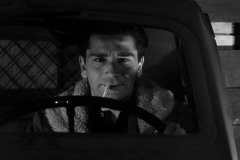 One of the pleasures of living in San Francisco (and there's plenty of downsides, believe me) is the Noir City Film Festival, ably hosted and programmed by Eddie Muller these past four years. A long time ago, before the City became the playground of Don Johnson's Nash Bridges, Robin Williams's Mrs. Doubtfire, and other dubious personages, San Francisco rivalled LA as Noir Central. We're talking long time ago as in Robert Mitchum in Out of the Past and Humphrey Bogart in The Maltese Falcon. (Fittingly enough, Sean Penn, the guest of honor at a weekend screening of his film The Pledge, picked the former as his favorite noir film, and apparently it's Bruce Springsteen's as well).
One of the pleasures of living in San Francisco (and there's plenty of downsides, believe me) is the Noir City Film Festival, ably hosted and programmed by Eddie Muller these past four years. A long time ago, before the City became the playground of Don Johnson's Nash Bridges, Robin Williams's Mrs. Doubtfire, and other dubious personages, San Francisco rivalled LA as Noir Central. We're talking long time ago as in Robert Mitchum in Out of the Past and Humphrey Bogart in The Maltese Falcon. (Fittingly enough, Sean Penn, the guest of honor at a weekend screening of his film The Pledge, picked the former as his favorite noir film, and apparently it's Bruce Springsteen's as well).Appreciating old movies, "classic" or not, can be an interesting phenomenon. You're either into it or you're not. I know people who refuse to see black-and-white films because they're, well, not in color. Others can't get past the acting styles or filmmaking limitations of the period. But rather than pooh-poohing old-film love entirely as reactionary, misguided nostalgia ("when men was men and dames was dames"), I prefer to think of it as an able substitute for your standard lodgy history lecture. Noir classics reveal an awful lot about life, love, and death in America circa 1940, and the ones that persist have a thing or two to say about us today, and forever.
So with a salute to them men and dames, here's a few capsule reports on films I saw at this year's festival:
Thieves' Highway (1949, Dir. Jules Dassin)
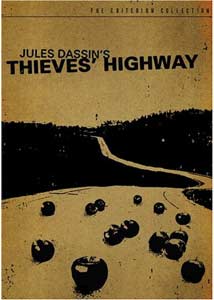 Nico 'Nick' Garcos: Do you know what it takes to get an apple so you can sink your beautiful teeth in it? You gotta stuff rags up tailpipes, farmers gotta get gypped, you jack up trucks with the back of your neck, universals conk out...
Nico 'Nick' Garcos: Do you know what it takes to get an apple so you can sink your beautiful teeth in it? You gotta stuff rags up tailpipes, farmers gotta get gypped, you jack up trucks with the back of your neck, universals conk out...Rica: I don't know what are you talking about, but I have a new respect for apples.
Eddie Muller credits Thieves' Highway as being the original inspiration behind the Noir City festival, and it's easy to see why; it's proof of how wide-ranging the concept of noir is. Having previously seen Dassin's Rififi and Night and the City, and knowing that Dassin was forced to flee the States in the 50s thanks to the Red Scare, I was prepared for a twisty-turny plot, a memorable cast of lowlifes and would-be highlifes, and some not-so-veiled shots at the capitalist way of life -- all of which are delivered full force. What I didn't expect was a Bildungsroman.
The plot, based on a book by A.I. Bezzerides titled Thieves' Market, is elemental: World War II vet Nick Garcos (Richard Conte) returns home to an idyllic existence in Fresno, only to find that his tomato-farmer pappy is crippled thanks to some dealings with the underhanded produce seller Mike Figlia (Lee J.Cobb). Vowing vengeance, Nick falls in with hard-bitten apple man Ed (Millard Mitchell), and the two of them make the 36-hour haul to San Francisco's bustling Embarcadero produce district. Beating Figlia at his own game may be foremost on Nick's mind, but when he's seduced by local temptress Rica (Valentina Cortesa) and given an offer he can't refuse by Figlia, motives become muddled, to say the least.
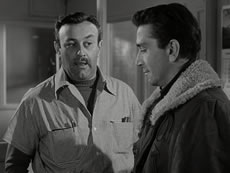 Nick ain't your typical flawed noir patsy, and he's not an ineffectual idealist either -- as played by Conte, he's a guy with impeccable morals and determination. But such strong stuff doesn't stand a chance against the wiles of Figlia and a cut-throat marketplace, as he is systematically divested of his truckload of apples, his money, and his pride. Then again, no one in the film escapes unscathed. Nick's partner Ed, trailed by two laughable but faintly intimidating competitors who want to horn in on his shipment, maxes out his beaten-up truck, with disastrous results. Rica may be the femme fatale (and she brings the house down with a simple line: "Aren't women wonderful?"), but her come-hither wiles can't mask the haunted look in her eyes, the knowledge that she has come to her own dead end. Even the Fresno life has its pitfalls, as Nick's sunny fiancee Polly (Barbara Lawrence), the blonde to Rica's brunette, is revealed to be as materialistic and grasping as the best of them. In such a climate, a man as transparently untrustworthy as Figlia almost comes as a relief (and in Cobb's insinuating performance, one sees the same qualities that America has often prided itself on -- quick-wittedness, the ability to wring an extra buck from a situation, bravado and cunning melted together).
Nick ain't your typical flawed noir patsy, and he's not an ineffectual idealist either -- as played by Conte, he's a guy with impeccable morals and determination. But such strong stuff doesn't stand a chance against the wiles of Figlia and a cut-throat marketplace, as he is systematically divested of his truckload of apples, his money, and his pride. Then again, no one in the film escapes unscathed. Nick's partner Ed, trailed by two laughable but faintly intimidating competitors who want to horn in on his shipment, maxes out his beaten-up truck, with disastrous results. Rica may be the femme fatale (and she brings the house down with a simple line: "Aren't women wonderful?"), but her come-hither wiles can't mask the haunted look in her eyes, the knowledge that she has come to her own dead end. Even the Fresno life has its pitfalls, as Nick's sunny fiancee Polly (Barbara Lawrence), the blonde to Rica's brunette, is revealed to be as materialistic and grasping as the best of them. In such a climate, a man as transparently untrustworthy as Figlia almost comes as a relief (and in Cobb's insinuating performance, one sees the same qualities that America has often prided itself on -- quick-wittedness, the ability to wring an extra buck from a situation, bravado and cunning melted together).Hanging over it all is the specter of post-war America, the lengths and hardships one must go through to make a buck. (It's indicative that Nick's truck, a requisitioned Army vehicle, has its wheels slashed by Figlia's goons early on -- watch that American dream sag to the ground.) Dassin is masterful at chronicling Nick's fall from grace; this film, like few before or since, accurately draws out the bone-tired weariness of a long haul on the road, the never-ending squabbles over money and fairness between workers and managers, the feeling of being battered on all sides by exhaustion and circumstance, until nothing is left but querulous rage. These passages are filmed with a documentary-like urgency, but Dassin also spices things up with some memorable setpieces, including a truck crash and the sight of thousands of apples careening down a hillside that still packs a punch. Most noir films are about glamorous people or shysters on the make; Thieves' Highway is a paean to the plight of the working stiffs.
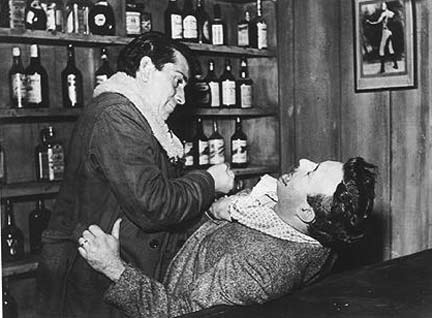 But make no mistake, this is a noir film. San Francisco is presented in bullet-tough shards of light and shadows, and our hero's descent from sun to the darkest despair is the same course charted by dozens of other tough guys. But we should be so lucky to lose our innocence to the charms of Rica, and who wouldn't succumb to Valentina Cortesa? Too chipper and casual to be a maneater, too elfin of face to be a sexbomb, too knowing of her foibles to be a trickster, she becomes the movie's warmest presence, against all odds. Thieves' Highway concludes with a upbeat ending that runs counter to the film's all-enveloping darkness (the ending was reshot by Darryl F. Zanuck to be more audience-friendly -- Bezzerides and Dassin no doubt stewed over that one), but Cortesa makes you believe, if only for a moment, that a happy ending is not only plausible but justified.
But make no mistake, this is a noir film. San Francisco is presented in bullet-tough shards of light and shadows, and our hero's descent from sun to the darkest despair is the same course charted by dozens of other tough guys. But we should be so lucky to lose our innocence to the charms of Rica, and who wouldn't succumb to Valentina Cortesa? Too chipper and casual to be a maneater, too elfin of face to be a sexbomb, too knowing of her foibles to be a trickster, she becomes the movie's warmest presence, against all odds. Thieves' Highway concludes with a upbeat ending that runs counter to the film's all-enveloping darkness (the ending was reshot by Darryl F. Zanuck to be more audience-friendly -- Bezzerides and Dassin no doubt stewed over that one), but Cortesa makes you believe, if only for a moment, that a happy ending is not only plausible but justified.
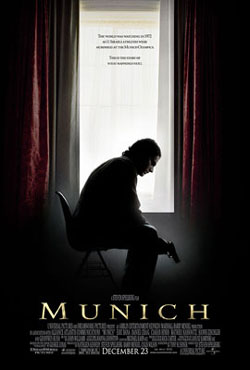
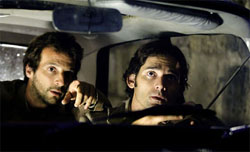 Some have heralded Munich as a synthesis of the two Spielbergs, as he melds a earnest message about violence and retribution with a sleek men-on-a-mission plot. Based on the novel Vengeance by George Jonas, the film has received much attention for its depiction (or misrepresentation, depending on who you ask) of spies, terrorists, and the Israel-Palestine question. Those who take Spielberg to task for humanizing terrorists or neglecting the pain of the Palestinians are not necessarily missing the point, but are failing to take into account that this is not a truthful, accurate account of what happens after the 1972 Olympics in Munich, nor does it claim to be (in any case, finding a singular "truth" about Israel and Palestine seems a hopeless task). This is an artist's take on the subject, representing his view of the world. As such, to dismiss it as propaganda or being inaccurate is to deny its purpose -- to foster debate and yes, disagreement. I am reminded of James Agee's famous statement: "It is my business to conduct one end of a conversation, as an amateur critic among amateur critics. And I will be of use and of interest only in so far as my amateur judgment is sound, stimulating, or illuminating." When Spielberg the filmmaker tackles the charged subjects he does in Munich, it behooves us to conduct our end of the conversation.
Some have heralded Munich as a synthesis of the two Spielbergs, as he melds a earnest message about violence and retribution with a sleek men-on-a-mission plot. Based on the novel Vengeance by George Jonas, the film has received much attention for its depiction (or misrepresentation, depending on who you ask) of spies, terrorists, and the Israel-Palestine question. Those who take Spielberg to task for humanizing terrorists or neglecting the pain of the Palestinians are not necessarily missing the point, but are failing to take into account that this is not a truthful, accurate account of what happens after the 1972 Olympics in Munich, nor does it claim to be (in any case, finding a singular "truth" about Israel and Palestine seems a hopeless task). This is an artist's take on the subject, representing his view of the world. As such, to dismiss it as propaganda or being inaccurate is to deny its purpose -- to foster debate and yes, disagreement. I am reminded of James Agee's famous statement: "It is my business to conduct one end of a conversation, as an amateur critic among amateur critics. And I will be of use and of interest only in so far as my amateur judgment is sound, stimulating, or illuminating." When Spielberg the filmmaker tackles the charged subjects he does in Munich, it behooves us to conduct our end of the conversation.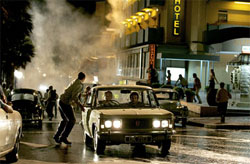 As a premise, this is a canny elaboration on true events (Mossad agents did spend years after Munich selectively taking out Palestinian terrorists), and Spielberg, who is at his best in concocting action scenes, spares no expense in adding colorful touches to the bloodletting. The first murder is vintage Coppola, with its coldly hysterical point of view and telling details (the victim collapses on top of wine and milk bottles, red and white mixing indiscriminately). Another sequence involving a booby-trapped phone and an innocent girl is a masterful riff of spatial logic, camera angles, and Hitchcockian suspense. Other assassinations are more brutal, with a clinical perspective that intensifies the horror. Between this and A History of Violence, 2005 might well be remembered as the year of the feel-bad vengeance movie. Filmed in muted colors by frequent collaborator Janusz Kaminski, this is a more shadowy, metallic film than any Spielberg has produced up to now.
As a premise, this is a canny elaboration on true events (Mossad agents did spend years after Munich selectively taking out Palestinian terrorists), and Spielberg, who is at his best in concocting action scenes, spares no expense in adding colorful touches to the bloodletting. The first murder is vintage Coppola, with its coldly hysterical point of view and telling details (the victim collapses on top of wine and milk bottles, red and white mixing indiscriminately). Another sequence involving a booby-trapped phone and an innocent girl is a masterful riff of spatial logic, camera angles, and Hitchcockian suspense. Other assassinations are more brutal, with a clinical perspective that intensifies the horror. Between this and A History of Violence, 2005 might well be remembered as the year of the feel-bad vengeance movie. Filmed in muted colors by frequent collaborator Janusz Kaminski, this is a more shadowy, metallic film than any Spielberg has produced up to now. But whither Spielberg, the humanist? He is present, in full glory, for Avner is not only a good soldier, but a conflicted father who misses his faithful wife and daughter even as he carries out his increasingly shady duty. For the most part, his targets are well-spoken, professorial, seemingly likeable types, which is meant to increase our queasiness at their deaths, and the moral quandaries escalate when they are replaced by more ruthless successors. Continuing in the vein of Spielberg movies with absent fathers, Avner finds himself stranded between two surrogate papas -- Ephraim, the nagging voice of country and loyalty who nevertheless denies Avner's very existence (so as to better complete his mission), and the Vito Corleone-like leader (Michael Lonsdale) of a French network of informants who aid Avner (but may also be selling him out to the enemy -- oh, those tricky French). The film's heart resides in the first meeting between Bana and Lonsdale; they both cook together for a family party in the latter's French countryside manor, in a scene that harkens to The Godfather's moments of bustling gaeity, even as it torpedoes the conceit with a blasphemous prayer at the dinner table. The killer and the informant gain an appreciation for each other ("butcher's hands, gentle souls"), as well as an understanding of their devotion to something more substantial than doctrine or nation: family. In the end, Spielberg's hero opts for family over country, as Avner finds himself estranged from Israel, unsure if he is targeted for assassination himself, and flees to Brooklyn with his brood. But even this is relative happiness compared to most films of this ilk -- Spielberg wants to recapture the bulging paranoia and mistrust of authority that informs the great 70s conspiracy thrillers such as
But whither Spielberg, the humanist? He is present, in full glory, for Avner is not only a good soldier, but a conflicted father who misses his faithful wife and daughter even as he carries out his increasingly shady duty. For the most part, his targets are well-spoken, professorial, seemingly likeable types, which is meant to increase our queasiness at their deaths, and the moral quandaries escalate when they are replaced by more ruthless successors. Continuing in the vein of Spielberg movies with absent fathers, Avner finds himself stranded between two surrogate papas -- Ephraim, the nagging voice of country and loyalty who nevertheless denies Avner's very existence (so as to better complete his mission), and the Vito Corleone-like leader (Michael Lonsdale) of a French network of informants who aid Avner (but may also be selling him out to the enemy -- oh, those tricky French). The film's heart resides in the first meeting between Bana and Lonsdale; they both cook together for a family party in the latter's French countryside manor, in a scene that harkens to The Godfather's moments of bustling gaeity, even as it torpedoes the conceit with a blasphemous prayer at the dinner table. The killer and the informant gain an appreciation for each other ("butcher's hands, gentle souls"), as well as an understanding of their devotion to something more substantial than doctrine or nation: family. In the end, Spielberg's hero opts for family over country, as Avner finds himself estranged from Israel, unsure if he is targeted for assassination himself, and flees to Brooklyn with his brood. But even this is relative happiness compared to most films of this ilk -- Spielberg wants to recapture the bulging paranoia and mistrust of authority that informs the great 70s conspiracy thrillers such as 